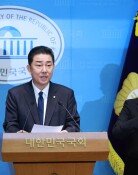Exiled to China, They Resisted Japan
Exiled to China, They Resisted Japan
Posted August. 14, 2006 03:07,
South Korean students and ethnic Korean students of Chinese nationality (joseonjok) visited anti-Japanese resistance movement historic sites in Yanbien of Jilin province, which is an autonomous region for ethnic Koreans, on August 9 and 10, with Koreas Liberation Day ahead.
They were middle school, high school and university students from both Korea and China, who took part in the Korea-China Youth Cultural Festival to Promote Friendly Relations organized by the Young Korean Academy (YKA)s Nation Unity Campaign Center and Yanbien University, in a eight-day program, taking place from August 4 to 11. Fifty-seven students (39 Koreans, 18 ethnic Koreans) took part in this event, which is taking place for the ninth time.
Students first visited Shanghai, where the provisional Korean government during Japanese colonial rule was located, and also Longjing Middle School in Longjing city, one of the two most important places in the anti-Japanese resistance movement. Five schools including Kwangmyung Middle School, the school that poet Yoon Dong-ju attended, and Eunjin Middle School, which patriot Lee Jun attended, were joined together in 1946 and named Longjing Middle School. Now, mostly ethnic Korean students are studying there.
Soon after, the students visited the Cheong-san-li battlefield in Huhlong city and the Bong-o-dong battle monument in Tumen city.
The reactions that students from the two countries showed at the sites were different. Yang Jun-yeol (Age 17, Daejeon High School) said after he arrived at the Cheong-san-li battle site, The place is surrounded by just mountains and fields so the stories that I heard about didnt feel all that lifelike, but after hearing explanations about the fierce fighting situation at the time, I was overwhelmed by emotions.
But ethnic Korean students showed little reaction, perhaps because it was the first time hearing explanations about people or events that they had been completely unaware of. Kim Chun-mi (Age 22, Sun Yang Teachers College) merely shook her head from side to side while listening to the guides explanation about anti-Japanese resistance activity that took place in Longjing and the poet Yoon Dong-jus life at the Yoon Dong-ju memorial center. Kim Ye-ran (Age 41), a teacher in Yanji City, explained, Ethnic Korean schools do not teach the history of our people, so there are not many students who know that our people fought in an anti-Japanese movement in China as well.
YKA representative Park Won-chul said, This trip showed that there is a big difference between the students from the two countries, having different nationalities and knowledge about history, but it also made clear that we are of the same heritage.
wing@donga.com



![‘건강 지킴이’ 당근, 효능 높이는 섭취법[정세연의 음식처방]](https://dimg.donga.com/c/138/175/90/1/wps/NEWS/IMAGE/2026/01/18/133181291.1.jpg)



